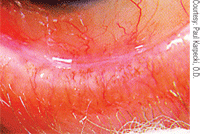Q: I have a patient who has rosacea and is taking oral doxycycline. A friend mentioned that it might interfere with her birth control pills. Is there any evidence that doxy interferes with the efficacy of the oral contraceptive pill?

A: Because the liver plays a role in the breakdown of doxycycline as well as oral contraceptives, some clinicians have expressed concerns that the use of doxycycline might interfere with the efficacy of contraception when both drugs are used concomitantly.
Concurrent Medication Use
“There have been no studies to clarify this,” says James V. Aquavella, M.D., professor of ophthalmology at the University of Rochester Flaum Eye Institute. “While this may be a theoretical concern, there is very little chance of the contraceptive action being adversely affected in these circumstances and patients should be counseled accordingly,” he adds.
While doxycycline has not been proven to disturb the effectiveness of the birth control pill, eye care practitioners should be aware of other drug interaction concerns. When considering doxycycline therapy for your patients, a thorough history is key in preventing potentially harmful interactions with systemic medications. Because the agent is often used in patients with chronic ocular diseases, prescribing O.D.s should be mindful of patients who are on warfarin treatment.
“Doxycycline should be used with caution in patients on Coumadin (warfarin, Bristol-Myers Squibb) due to the increased anticoagulant effect that can be initiated,” says Jill Autry, O.D., R.Ph. “The two medications compete for albumin binding and both inhibit the cP450 system, which can increase levels of warfarin and result in increased bleeding.”
But, the increased risk for bleeding does not apply to platelet inhibitors, such as aspirin or Plavix (clopidogrel, Sanofi Aventis), which are not anticoagulants.
Significant lid disease in patient with ocular rosacea.
Additional Contraindications

Doxycycline is in the pregnancy category D, which means it is not to be used in pregnant and pediatric patients. As an antibiotic in the tetracycline class, doxycyline’s primary side effect in regard to pregnancy and children is deposition in teeth and bones.
“This deposition is due to the ability of the cycline class of antibiotics to form a chelation complex with calcium. This chelation puts both teeth and bone at risk for tooth discoloration and poor bone formation, respectively,” says Dr. Autry.
However, a study on children with Rocky Mountain Spotted Fever (RMSF), the amount of tooth discoloration was not increased in those treated with doxycycline vs. control subjects.1 Dr. Autry notes that the risk of growth retardation stemming from bone chelation is most significant when the agent is administered during mid to late pregnancy or in the neonatal period. However, the tetracycline class of drugs is generally contraindicated until after age 8 to avoid the increased risk during this developmental time.
“In cases where a tetracycline antibiotic is unavoidable—such as RMSF—doxycycline is generally preferred over other tetracyclines because it is less strongly bound to calcium and may produce fewer adverse effects,” says Dr. Autry.
Keep in mind that all these potential risk factors and drug interaction concerns before you prescribe doxycycline therapy for your rosacea patients. Once you’ve determined that doxycycline is safe, advise patients to take it with food to decrease the potential of gastrointestinal side effects and not take it at bedtime to avoid the potential for esophageal irritation.
1. Lochary ME, Lockhart PB, Williams WT. Doxycycline and staining of permanent teeth. Pediatr Infect Dis J. 1998 May;17(5):429-31.

